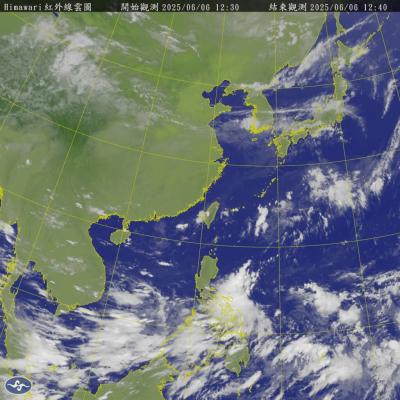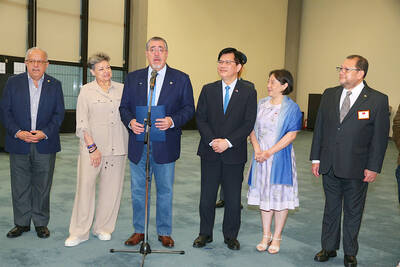US President George W. Bush's summit with Chinese President Hu Jintao (
Although Hu is expected to forcefully raise the Taiwan issue as Chinese leaders normally do during high-level bilateral exchanges, US officials expect that both sides will reiterate their well-known positions and move on to other issues on the crowded agenda.
Lessening the chances of substantive discussion is the fact that the two leaders will meet relatively briefly -- on Wednesday morning and then again later in the day -- and will have a long list of pressing issues to discuss.
North Korea and strained US-China trade issues are expected to dominate the agenda.
They will form the so-called working agenda, in which both sides expect to engage in a dialogue to narrow differences over the six-party talks on Korea, as well as other issues such as the US trade deficit with China and Washington's efforts to get Beijing to revalue the yuan.
Among the second tier of issues, which will be brought up but not discussed at length, Taiwan will head the list. But any discussions are expected to be perfunctory.
"I don't think any real work will be done" on the Taiwan issue, said former deputy assistant secretary of state Randall Schriver. "I'm told by the administration that [on the US side] it will be a reiteration of our policy and to expect no change on Taiwan. This will be relatively pro forma."
One of the reasons for this is that China is not as concerned about the direction of President Chen Shui-bian's (
`MORE RELAXED'
China is "more relaxed about the situation in Taiwan. They feel they're in control," says Bonnie Glaser, a China foreign-policy expert at the Center for Strategic and International Studies.
"They feel that US policy is not really in any way undermining their interests at the moment, and that time is on their side," she added.
While Beijing is still concerned by US arms sales to Taiwan and what it describes as Washington sending the "wrong signals" to Taipei, Glaser felt the situation had changed in Taiwan over the past year.
"They view that the internal constraints on Chen Shui-bian's making a move that would be worrisome to Beijing are stronger now. The election of Ma Ying-jeou (
She said that what Hu wants to do during the meeting with Bush is "check the box."
Glaser added that Hu "wants President Bush to repeat the mantra" that Washington will adhere to the three joint communiques, emphasizing the spirit of the documents and not just the words, will oppose Taiwan independence, and wants "no unilateral change in the status quo."
Schriver said that the Bush administration now "is in a more comfortable place in its relationship with Taiwan and feels a little better about things," then it did when Wen visited, Schriver said on Thursday.
"The re-election of Chen has helped his own confidence at home. I think we've gotten to know the DPP a little better, and they've gotten to know us a little bit better, and there's an effort to improve the channels of communication and dialogue that are unseen and below the radar of the press," he said.
ITINERARY
Hu will arrive in Washington on Tuesday evening after a stopover in Seattle, where he will deliver a speech on trade relations, and visit the headquarters of Boeing. On the eve of the summit, China Southern Airlines signed a contract to buy 10 Boeing 787 aircraft for some US$1.2 billion.
While it is not a state visit, Hu will be given a White House welcome on Wednesday morning, complete with a 21-gun salute and mutually congratulatory speeches amid a sea of dignitaries on the South Lawn.
Observers note that Bush had offered a longer, more casual visit at his Crawford, Texas, ranch and at the presidential retreat at Camp David, but the Chinese opted for the pomp and prestige of a state visit-like welcome and an Oval Office meeting.
There will not be, however, a state dinner. Instead, Hu will deliver a speech at a dinner hosted by the US-China Business Council, the US Chamber of Commerce and other pro-Beijing organizations.
The next day, he will travel to Yale University to deliver another address. Yale is Bush's alma mater, and the stop is being made in return for an address Bush made to Hu's alma mater, Tsinghua University, in February 2002.
Later on Thursday, Hu will travel to Canada, where, according to some observers, he will lobby against a bill in parliament that seeks to enact a law similar to the US' Taiwan Relations Act, which would cement relations between Ottawa and Taipei.
The Canadian government, however, has voiced its opposition to the bill.
He will also visit Mexico and end his North American trip at the special 60th anniversary global summit at the UN General Assembly from Sept. 14 until Sept. 16.

Greenpeace yesterday said that it is to appeal a decision last month by the Taipei High Administrative Court to dismiss its 2021 lawsuit against the Ministry of Economic Affairs over “loose” regulations governing major corporate electricity consumers. The climate-related lawsuit — the first of its kind in Taiwan — sought to require the government to enforce higher green energy thresholds on major corporations to reduce emissions in light of climate change and an uptick in extreme weather. The suit, filed by Greenpeace East Asia, the Environmental Jurists Association and four individual plaintiffs, was dismissed on May 8 following four years of litigation. The

STAY AWAY: An official said people should avoid disturbing snakes, as most do not actively attack humans, but would react defensively if threatened Taitung County authorities yesterday urged the public to stay vigilant and avoid disturbing snakes in the wild, following five reported snakebite cases in the county so far this year. Taitung County Fire Department secretary Lin Chien-cheng (林建誠) said two of the cases were in Donghe Township (東河) and involved the Taiwan habus, one person was bit by a Chinese pit viper near the South Link Railway and the remaining two were caused by unidentified snakes. He advised residents near fields to be cautious of snakes hiding in shady indoor areas, especially when entering or leaving their homes at night. In case of a

A tropical disturbance off the southeastern coast of the Philippines might become the first typhoon of the western Pacific typhoon season, the Central Weather Administration (CWA) said. The system lacks a visible center and how it would develop is only likely to become clear on Sunday or Monday, the CWA said, adding that it was not yet possible to forecast the potential typhoon's effect on Taiwan. The American Meteorological Society defines a tropical disturbance as a system made up of showers and thunderstorms that lasts for at least 24 hours and does not have closed wind circulation.

DIPLOMACY: It is Guatemalan President Bernardo Arevalo’s first visit to Taiwan since he took office last year, while Eswatini’s foreign minister is also paying a visit A delegation led by Guatemalan President Bernardo Arevalo arrived in Taiwan yesterday afternoon and is to visit President William Lai (賴清德) today. The delegation arrived at Taiwan Taoyuan International Airport at 4:55pm, and was greeted by Minister of Foreign Affairs Lin Chia-lung (林佳龍). It is Arevalo’s first trip to Taiwan since he took office last year, and following the visit, he is to travel to Japan to celebrate the 90th anniversary of diplomatic relations between the two countries. Arevalo said at the airport that he is very glad to make the visit to Taiwan, adding that he brings an important message of responsibility